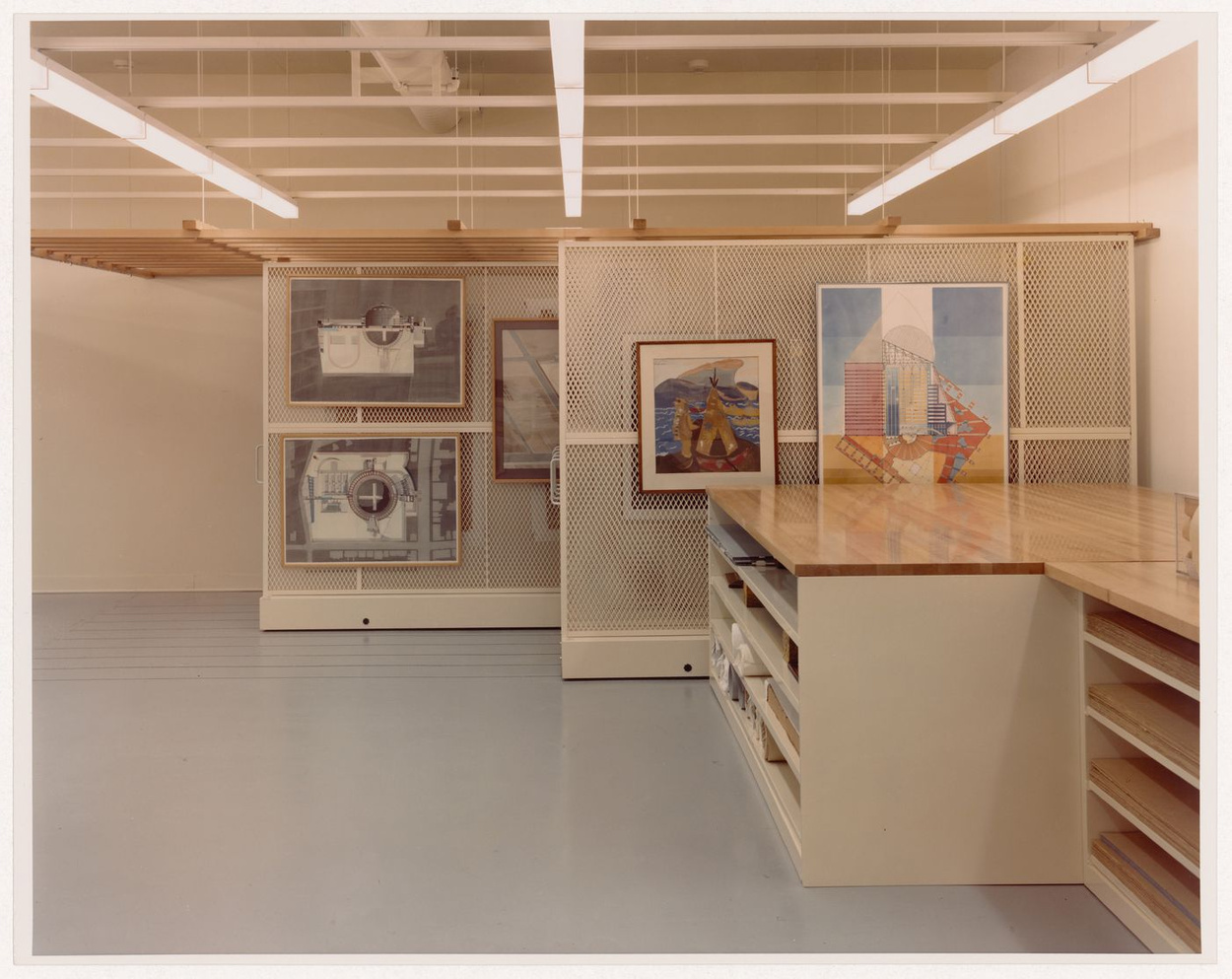15 February 2024
Thursday
10AM EST / 4PM CET
Emerging from DocTalks’ participation in the CCA’s 2023 Toolkit for Today seminar on Collectivity, these sessions bring together the cohort of students who participated in the CCA’s Doctoral Research Residency Program in the summer of last year. Across four groups and two sessions, they centre questions related to how architectural historical inquiry can be undertaken in common through dialogue and mutual support. By surfacing encounters with the CCA Collection, they collaboratively intertwine their experiences of interrogating archive-driven research.
 Gabor Szilasi, Interior view of the Prints and Drawings Collection storage vault on level 2 showing presentation drawings
Gabor Szilasi, Interior view of the Prints and Drawings Collection storage vault on level 2 showing presentation drawings
hung on storage racks, Canadian Centre for Architecture, Montréal, Québec
Ariel Richards, Lu Zhang, Chenchen Yan
Respondent: Magdalena Miłosz, Parks Canada
How to decenter canons and colonial archives? Redefining archival work as a collaboration. We argue that to read canonical representation and colonial archives against the grain, we need to reconceptualize archival work as collaborative processes constituted not only by the author but also by different voices and agents, including those who participated in the collecting, cataloguing, organizing, circulating, and interpreting of the materials.
***
Alejandro Saldaña Perales, Duy Mac, Romain David
Respondent: Shivani Shedde, Princeton University
In assessing the environment where architecture unfolds, one identifies how deeply intertwined political and economic systems are related to it. Few disciplines are more at the political and economic nexus than architecture and urban planning. How can architectural archives inform or challenge categories of political economy? For example, how do you study global dynamics, international relations, political imagination, urban development, or global financial networks, the flow of finances? We aim to explore the variety of methods such an initial question opens through the lens of collective authorship. How do notions of collaboration help us better understand what kind of archival materials and documents should we look at? Against this heterogeneity, what counts as evidence?
Thursday
10AM EST / 4PM CET
DocTalks x CCA
Session 1Emerging from DocTalks’ participation in the CCA’s 2023 Toolkit for Today seminar on Collectivity, these sessions bring together the cohort of students who participated in the CCA’s Doctoral Research Residency Program in the summer of last year. Across four groups and two sessions, they centre questions related to how architectural historical inquiry can be undertaken in common through dialogue and mutual support. By surfacing encounters with the CCA Collection, they collaboratively intertwine their experiences of interrogating archive-driven research.
 Gabor Szilasi, Interior view of the Prints and Drawings Collection storage vault on level 2 showing presentation drawings
Gabor Szilasi, Interior view of the Prints and Drawings Collection storage vault on level 2 showing presentation drawingshung on storage racks, Canadian Centre for Architecture, Montréal, Québec
Representation/Coloniality
Ariel Richards, Lu Zhang, Chenchen Yan
Respondent: Magdalena Miłosz, Parks Canada
How to decenter canons and colonial archives? Redefining archival work as a collaboration. We argue that to read canonical representation and colonial archives against the grain, we need to reconceptualize archival work as collaborative processes constituted not only by the author but also by different voices and agents, including those who participated in the collecting, cataloguing, organizing, circulating, and interpreting of the materials.
***
Political Economy
Alejandro Saldaña Perales, Duy Mac, Romain David
Respondent: Shivani Shedde, Princeton University
In assessing the environment where architecture unfolds, one identifies how deeply intertwined political and economic systems are related to it. Few disciplines are more at the political and economic nexus than architecture and urban planning. How can architectural archives inform or challenge categories of political economy? For example, how do you study global dynamics, international relations, political imagination, urban development, or global financial networks, the flow of finances? We aim to explore the variety of methods such an initial question opens through the lens of collective authorship. How do notions of collaboration help us better understand what kind of archival materials and documents should we look at? Against this heterogeneity, what counts as evidence?